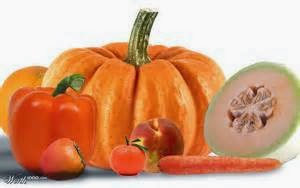Orange fruits and vegetables are packed with antioxidants, vitamins, minerals, and other nutrients. These nutrients reduce certain types of cancers, promote good overall eye health including lowering the risk for aged-related vision loss, help lower bad cholesterol, reduce high blood pressure, neutralize damaging free-radicals within the body, promote collagen formation, and help maintain healthy joints and bones. For these reasons and more, it is essential to include orange fruits and vegetables into your diet.
These are some nutrients commonly found in orange-coloured fruits and vegetables:
Beta-carotene
This is probably the most recognized nutrient in orange fruits and vegetables, because this antioxidant is responsible for giving the fruits and vegetables their bright orange colour. Beta-carotene is necessary for good eye and skin health. Research has shown that beta-carotene also plays a part in delaying premature cognitive aging.
Vitamin C
All orange fruits and vegetables contain Vitamin C. This vitamin boosts the immune system which is needed to fight infection and disease. Vitamin C also helps rebuild skin and lowers the risk of cardiovascular diseases.
Vitamin A
The best sources of Vitamin A are found in orange coloured fruits and vegetables. Vitamin A boosts the immune system and promotes good skin and eye health.
Potassium
A potassium-rich diet is known to decrease high blood pressure. Recent studies suggest that potassium may also reduce the risk of kidney stones and bone loss as you age.
Fibre
Many orange fruits and vegetables contain soluble fibre (fibre that is easily digested by the body). Soluble fibre can help prevent certain cancers, improve digestive health, help lower the risk of heart disease by lowering cholesterol and improve digestive health.
Some orange-coloured fruits include:
– Papaya
– Cantaloupe
– Peach
– Orange
– Mango
– Kumquat
– Persimmon
These fruits can be eaten as is, added to cereal and milk, added to salads, or incorporated into smoothies.
Some orange-coloured vegetables include:
– Sweet potato
– Acorn squash
– Pumpkin
– Carrot
– Butternut squash
Sweet potato can be used instead of regular potatoes to make mashed potatoes or fries. Sweet potato can also be added to soups. Pumpkin and squash can be made into curries or soups. Try roasting the butternut and winter squash for additional flavour. Carrots can be added to salads, pastas, soups, and muffins!
Eating a wide variety of fruits and vegetables are an important part of any healthy diet. Canada’s Food Guide recommends eating 5-10 servings of fruits and vegetables daily.
Feature image courtesy of imgarcade.com.




